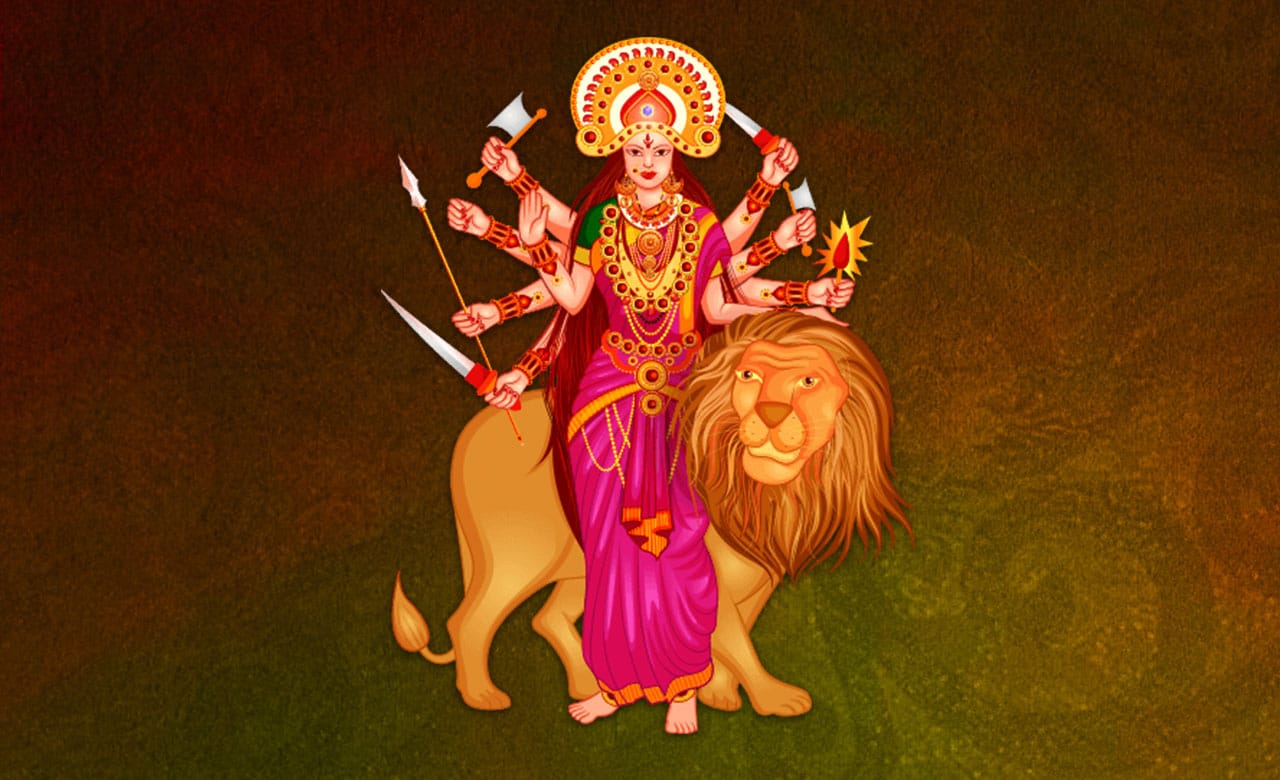
Informative
Importance of Durga Saptashati Paath During Navratri
The word Sapta means seven and the word Shati means a hundred. Durga Saptashati is a collection of seven hundred verses that narrate the greatness of Maa Durga. Every year during Navratri, Sadhaks are asked to recite the Durga Saptashati every day, preferably one chapter a day to increase their spiritual prowess and attain true wisdom, wealth, and clarity. In this blog, we discuss the importance of Durga Saptashati and its purpose.
The Saptashati has been around for more than three centuries and is as relevant today as it was at the time of its composition. The Saptashati is probably the oldest extant text in the world devoted entirely to a fiercely independent goddess who is also The Supreme Being — The Ultimate Godhead — The Divine Feminine.
In the text, more important than the stories and the myths, is the journey of a Sadhak from a new-born Sadhak to merging with the divine and beyond. Let’s understand this journey.
Part 1 –
Madhu Kaitabh –
Madhu means sweet and Kaitabh means bitter. The two most fundamental elements of human life. When a child is born, as parents begin feeding him or her food, the child develops intelligence with taste of food. While people can rise above taste, rising above the words sweet and bitter is very difficult. So much so that people begin relating to their memories as sweet and bitter. Same for experiences.
Even before the child develops taste, they can be consoled and pacified with sweet words and lullabies. The journey of self-realisation for a Sadhak comprises of many hurdles. The first hurdle is the sense of sweet and bitter. Rising above it, the Sadhak passes and becomes ready for the next phase.
For this, you can’t just apply force. Once needs the wisdom and foresight of Lord Vishnu. Lord Vishnu’s role in the universe is that of a sustainer. Once you rise above this hurdle, the wisdom you gain remains with you through your life. It’s like learning swimming, once you have learnt it, you can never forget it. So, as you recite the first part and understand it, Devi comes and destroys this hurdle from your path.
This does not mean you will stop understanding the difference. This just means that the duality will finish and non-duality will begin. You will still feel the taste. You will just rise above it. You won’t be affected by it anymore. You will begin understanding the difference between acceptance and rejection.
You will rise above taste and sound and you will begin thanking people for both good and bad words. You will stop being affected by what people say, how they say it and what they think about you. Then, the Goddess moves on to destroy the next hurdle.
Part 2 –
Mahishasura –
A sign of lust and rage, Mahishasura exists to knock down any seeker. When you go beyond taste and sound, you are tackled by Mahishasura. You need to channelize your entire energy here and hence Devi enters. She is the sign of Divine unlimited energy – Shakti. You cannot kill lust and anger, but you need to transform them. As lust and anger get transformed, they become sexual prowess and constructive rage, leading you to achieve and fulfil your goals, without causing any harm whatsoever on your spiritual progress. You aren’t bothered with sound and taste anymore and you have learnt to harness your energy like a tamed horse.
Part 3 –
Dhumralochan –
Dhumra means smoke and Lochan means eyes. Dhumralochan is sight full of illusion or smoke. We are constantly gathering information through our eyes and hence we need to purify our sight. One needs to be now mindful to rise about the illusion and not get distracted. No matter how profound or smart you are, you will go through stages similar to these if you are a true seeker. All the judgement, all the illusion, all the perceptions clear off and you learn how to look at things with child like curiosity but calm wisdom and clear experience. You will now be able to see auras and true colours of things, people, situations and places. You will now be able to see the truth and nothing but the truth. Your perspective of life will either change or be completely destroyed and you will start afresh.
You have now reached a stage where taste doesn’t bother you, sound doesn’t affect you, you have harnessed your energy and your world view is right.
Part 4 –
Chanda Munda
Chanda means passion, cruelty and violence and Munda means head, intelligence and inner conflicts. When you are moving on the self-realization journey, you may not be angry or lusty anymore and you might be at peace. You may have harnessed your energy, but you still need to channelize it somewhere. If you are passionate about anything, you will end up putting everything in that passion. It could be a cause good or bad. This is also a distraction for the Sadhak. This is where most seekers stop because they get distracted by power, wealth and the attention. This is where Maa Durga comes and destroys all the passion, cruelty, violence and inner conflicts to take us forward. You will now move forward without conflict and begin becoming one with your self-realization.
The entire debate of whether you took the right step or not, all the guilt, emotions, regret and hatred will pass, slowly, painfully but eventually, it will pass.
Part 5 –
Raktabeeja
Rakta means blood and Beeja means seed. Raktabeej had a special boon – for every drop of his blood that spilled on the battle field, a thousand demons would spring up same as him with his power and they would have the same boon. Raktabeej is your desires. As you keep fulfilling them, they will keep springing up and the cycle will go on and on. This is when Maa Durga comes in the form of aggression to settle you and drinks the blood.
By now, you have risen above taste, sound, lust, anger, judgement, violence, inner conflict and desire.
Part 6 –
Shumbh Nishumbh
Shumbh means pleasant and Nishumbh is unpleasant. Morality and immorality, right wrong, good bad, religious, sacrilegious. These thoughts will never leave you until you free yourself. You will keep judging your actions, thoughts, speech, and emotions as per other people’s opinions. This is when Maa comes and helps you free yourself but the real work needs to be done by you. Once you break free of this hurdle, you will stop having any of the negative emotions and energies. Everything will vanish and you will have arrived at the final stage. You will have become an embodiment of compassion and love. This is your true nature.
Part 7 –
Surath and Samadhi
Now Maa comes and holds the boon to Surath and Samadhi. Surath means vehicle or chariot. The greatest vehicle is insight and wisdom. Where you rise above duality and begin seeing the world as one. Samadhi means oneness. That is the outcome, the Kundalini rising. Try as one might, Surath and Samadhi cannot be explained in words. One needs to experience them to understand them.
As the six demons are destroyed by the Goddess and the Sadhak reaches the seventh part, they become Sant, Arihant and become one with the divine.
We hope our attempt at explaining the Durga Saptashati’s importance helps and encourages you to study it and recite it every day during Navratri. Please feel free to write to us in case of any queries and we will be happy to answer them for you. Our email is – info@chamundaswamiji.com
Post a Comment
-
Subscribe to Our Blog
-
Categories
-
Popular Articles
- Dead moth in the house. What universe is trying to tell you?
- Spiritual Meaning of Moth
- Vivah Bandhan Curse – What Is It and How to Spiritually Heal It.
- The Dasa Mahavidyas
- What are Beej Mantras?
- Tripura Sundari | The Dasa Mahavidya
- Maa Bhuvaneshwari | The Dasa Mahavidyas
- The Five Shades of Tantra
- Ramakrishna Paramhansa – The Man who almost became a Woman
- Maa Chinnamasta | The Dasa Mahavidyas



